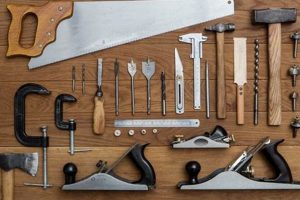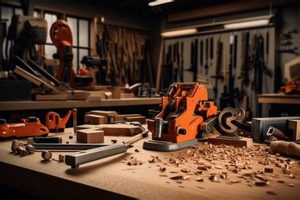A popular online forum provides a space for enthusiasts to discuss fundamental implements employed in shaping wood. This platform serves as a repository of knowledge where individuals exchange information, advice, and opinions concerning essential hand tools and power tools used in woodworking. Discussions often center around selecting appropriate tools for beginners, comparing brands and models, and troubleshooting common issues encountered during woodworking projects.
This communal resource offers several advantages. It allows novices to learn from experienced woodworkers, thereby accelerating the learning process. The diversity of perspectives and experiences shared can help users make informed purchasing decisions and avoid costly mistakes. Historically, woodworking knowledge was passed down through apprenticeships; this type of online community serves as a modern equivalent, democratizing access to this body of knowledge.
The following sections will explore specific types of hand tools frequently mentioned within this forum, examine essential power tools commonly recommended, and discuss strategies for selecting a suitable toolkit for those beginning their woodworking journey. Safety considerations, crucial for all woodworking activities, will also be addressed.
Essential Guidance
This section presents practical advice gleaned from a community dedicated to woodworking, focusing on the fundamental equipment required for successful projects.
Tip 1: Prioritize Hand Tools Initially. Before investing heavily in power tools, acquire a solid foundation in hand tool techniques. This approach fosters a deeper understanding of wood behavior and allows for greater control during shaping and joinery.
Tip 2: Invest in Quality Chisels. High-quality chisels are indispensable for precise woodworking. Look for chisels made from high-carbon steel, and maintain their sharpness with regular honing. A set of three or four chisels of varying widths is generally sufficient for starting out.
Tip 3: Acquire a Reliable Hand Saw. A good-quality hand saw, such as a dovetail saw or a tenon saw, provides accuracy in cutting joinery. Learn to sharpen the saw blades or budget for professional sharpening services to ensure consistent performance.
Tip 4: Secure a Sturdy Workbench. A solid workbench is the cornerstone of any woodworking shop. Ensure the bench is stable and provides adequate clamping surfaces for securing workpieces. Consider building a simple workbench as an early project.
Tip 5: Emphasize Accurate Measuring Tools. Precision is paramount in woodworking. Invest in a combination square, a measuring tape, and a marking gauge to ensure accurate measurements and consistent layouts. A digital angle finder can be helpful for more complex angles.
Tip 6: Consider Used Tools. Quality used tools can often be found at estate sales, flea markets, or online marketplaces at significantly lower prices than new tools. Inspect used tools carefully for damage or excessive wear before purchasing.
Tip 7: Sharpening is Essential. Dull tools are not only less efficient but also more dangerous. Learn proper sharpening techniques for chisels, planes, and saws. Invest in a sharpening stone or system and maintain tools regularly.
Adhering to these guidelines will enhance the woodworking experience, promote safety, and contribute to the creation of high-quality projects. Mastering the fundamentals is crucial before advancing to more complex techniques and equipment.
This guidance prepares the woodworker to tackle fundamental tasks, leading to more advanced projects and skills.
1. Beginner Tool Suggestions
Within the “basic woodworking tools reddit” online community, a frequent topic involves guidance for newcomers selecting their initial set of equipment. These recommendations serve as a critical entry point, shaping the trajectory of a beginner’s woodworking journey.
- Starter Kit Evaluations
Discussions frequently center on the value and suitability of pre-packaged tool kits. These kits offer a convenient, albeit potentially limiting, introduction. The forum provides a platform for users to dissect the contents of these kits, weighing the quality and utility of individual components against the overall cost. For instance, a kit might include a low-quality hand plane that necessitates immediate replacement, rendering the initial saving illusory.
- Essential Individual Tools
Alternatively, users often advocate for a curated selection of individual tools, emphasizing quality over quantity. This approach typically prioritizes tools such as a reliable hand saw, a set of sharp chisels, and accurate measuring instruments. Such recommendations often include specific brand and model suggestions, grounded in user experience and performance reviews. The rationale is that investing in a few high-quality tools from the outset promotes better technique and avoids the frustration associated with subpar equipment.
- Budget Considerations and Prioritization
Financial constraints invariably influence tool selection. The forum provides advice on allocating limited resources effectively. For example, purchasing used tools in good condition or opting for more affordable brands for less frequently used items are common strategies. The prioritization often reflects the types of projects the beginner intends to undertake, focusing on the tools most relevant to those initial endeavors.
- Learning Resources and Usage Advice
Tool recommendations are frequently accompanied by links to relevant learning resources, such as online tutorials or instructional videos. Users share their own experiences and offer practical advice on proper tool usage and maintenance. This collaborative learning environment helps beginners develop proficiency and avoid common mistakes.
The diverse perspectives shared within the “basic woodworking tools reddit” community provide a valuable resource for beginners navigating the often-overwhelming process of assembling their first tool collection. These discussions highlight the importance of balancing cost, quality, and project-specific needs to ensure a positive and productive introduction to woodworking.
2. Tool Brand Comparisons
The “basic woodworking tools reddit” community provides a platform for extensive tool brand comparisons. These discussions are a direct result of users seeking informed purchasing decisions, influenced by budget, project requirements, and perceived quality. A brand’s reputation can significantly impact a potential buyer’s choice, particularly within the context of online information aggregation and user-generated reviews. For example, discussions frequently address the relative merits of established brands like Lie-Nielsen versus more budget-friendly options, assessing factors such as steel quality, manufacturing precision, and long-term durability. The importance of these comparisons stems from their ability to democratize information, enabling users to avoid marketing hype and make data-driven choices. These comparisons often involve detailed analyses of specific tools, such as hand planes or chisels, where nuances in design and material contribute significantly to performance.
Further analysis often involves dissecting individual tool attributes. Users may compare the handle ergonomics of different hand saws, evaluating comfort and control over extended use. Discussions concerning power tools can revolve around motor performance, vibration levels, and dust extraction capabilities. These detailed comparisons frequently incorporate user experiences, providing practical insights that transcend manufacturer specifications. For instance, a user might share their experience of a specific brand’s table saw exhibiting excessive blade runout, a defect not typically highlighted in promotional materials. Such real-world feedback adds considerable weight to the brand comparisons, influencing purchasing decisions and shaping brand perception within the community.
In conclusion, tool brand comparisons are a vital component of the “basic woodworking tools reddit” forum. These discussions empower users to make informed choices, mitigating the risk of purchasing unsuitable or unreliable tools. The forum’s collective knowledge base, comprising user experiences and detailed analyses, serves as a valuable resource for both novice and experienced woodworkers, ultimately contributing to a more informed and discerning woodworking community. The challenge remains ensuring the accuracy and impartiality of the information shared, relying on the community’s self-regulation to identify and address any potential biases.
3. DIY Project Recommendations
Within the “basic woodworking tools reddit” ecosystem, DIY project recommendations serve as a critical catalyst, driving engagement, knowledge sharing, and practical application of woodworking skills. These recommendations, ranging from simple birdhouses to more complex furniture pieces, provide a tangible context for the discussion and utilization of fundamental woodworking implements. The forum’s architecture fosters a symbiotic relationship: project suggestions necessitate tool discussions, while tool inquiries often arise from specific project ambitions. A user contemplating building a small bookshelf, for example, might solicit advice on appropriate saw types and joinery techniques, thus triggering a discussion on various tools and their optimal applications. This interaction underscores the practical significance of project recommendations, transforming abstract tool knowledge into actionable woodworking endeavors.
The impact of DIY project recommendations extends beyond mere tool selection. These suggestions often include detailed plans, step-by-step instructions, and troubleshooting advice, fostering a collaborative learning environment. Users share their experiences, modifications, and alternative approaches, enriching the project’s overall value. Consider the example of building a workbench: numerous iterations and adaptations are commonly discussed, reflecting individual preferences and available resources. These discussions can lead to improved designs, refined techniques, and a deeper understanding of woodworking principles. Furthermore, project recommendations frequently incorporate safety considerations, emphasizing the importance of proper tool handling and personal protective equipment. This focus on safety reinforces responsible woodworking practices within the community.
In conclusion, DIY project recommendations are an integral component of the “basic woodworking tools reddit” experience, serving as a practical bridge between theoretical knowledge and hands-on application. This interconnectedness fosters a dynamic learning environment, encouraging users to explore, experiment, and refine their woodworking skills. The continuous cycle of project suggestion, tool discussion, and experience sharing contributes significantly to the community’s collective expertise. The challenges associated with inaccurate information or overly complex projects can be mitigated through community moderation and peer review, ensuring the overall value and reliability of the forum’s DIY project recommendations.
4. Safety Advice Repository
Within the “basic woodworking tools reddit” community, a dedicated repository of safety advice serves as a crucial resource, mitigating the inherent risks associated with woodworking activities. This collection of guidelines, best practices, and cautionary tales functions as a collective effort to promote a safe and responsible woodworking environment. The presence and accessibility of this repository directly correlate with the reduction of accidents and the cultivation of informed woodworking practices.
- Personal Protective Equipment (PPE) Recommendations
This facet encompasses detailed recommendations regarding appropriate PPE, including safety glasses, hearing protection, and dust masks or respirators. Discussions address the specific risks associated with various woodworking tasks and recommend corresponding protective measures. For example, users routinely emphasize the necessity of wearing safety glasses when operating power tools to prevent eye injuries from flying debris. The repository often includes links to reputable sources for purchasing certified PPE, ensuring users have access to reliable protective gear. The implications are a reduced incidence of preventable injuries and a heightened awareness of workplace safety standards.
- Tool Handling Procedures
Safe tool handling procedures are a cornerstone of the repository. Detailed instructions are provided for the proper use and maintenance of various hand and power tools. These instructions often include visual aids, such as diagrams or videos, demonstrating correct techniques. For example, the repository might contain a guide on safely operating a table saw, emphasizing the importance of using push sticks and feather boards to prevent kickback. The consistent dissemination of safe tool handling procedures aims to minimize user error and promote skillful woodworking practices. Failure to adhere to these procedures can lead to severe injuries, highlighting the importance of this facet.
- Workshop Setup and Organization
The repository addresses the importance of a safe and organized workshop environment. Recommendations include proper ventilation, adequate lighting, and the strategic placement of tools and equipment. Discussions often focus on minimizing trip hazards, preventing electrical shocks, and ensuring easy access to emergency equipment. For example, users might share tips on organizing power cords and dust collection systems to maintain a clutter-free workspace. A well-organized workshop not only enhances safety but also improves efficiency and productivity, creating a more conducive environment for woodworking activities.
- First Aid and Emergency Procedures
The repository includes guidelines on basic first aid procedures relevant to woodworking injuries, such as cuts, splinters, and eye irritations. Information on emergency contact numbers and the location of local medical facilities is also provided. Users are encouraged to create a comprehensive first aid kit and familiarize themselves with emergency protocols. While preventative measures are paramount, the repository acknowledges the possibility of accidents and provides resources to minimize their impact. This facet underscores the community’s commitment to the well-being of its members.
These facets collectively contribute to a comprehensive safety advice repository within the “basic woodworking tools reddit” community. This resource promotes safer woodworking practices, reduces the risk of injuries, and fosters a culture of responsibility among its members. The continuous updating and refinement of this repository, based on user experiences and evolving safety standards, ensures its ongoing relevance and effectiveness.
5. Sharpening/Maintenance Discussions
The presence and depth of sharpening and maintenance discussions within the “basic woodworking tools reddit” community are directly proportional to the longevity and performance of woodworking implements. Dull tools not only compromise the quality of work but also increase the risk of injury. Therefore, the frequent exchange of information regarding sharpening techniques, tool care, and preventative maintenance forms a critical component of the online forum. The discussions serve as a repository of practical knowledge, providing users with the means to extend the lifespan of their tools and maintain optimal working conditions.
These discussions encompass a wide range of topics, from selecting appropriate sharpening stones and honing guides to addressing specific maintenance concerns for various tool types. For example, a thread might detail the process of flattening the back of a new chisel or the proper lubrication of a hand plane’s sole. Users often share their preferred methods, products, and problem-solving strategies, creating a collaborative learning environment. The sharing of experiences, coupled with detailed instructions, empowers individuals to undertake essential maintenance tasks independently, thereby reducing reliance on professional services and minimizing downtime. These maintenance routines translate into cost savings and increased efficiency over time.
In conclusion, the robust sharpening and maintenance discussions within the “basic woodworking tools reddit” community are indispensable for preserving the effectiveness and safety of woodworking tools. The dissemination of best practices, troubleshooting advice, and collaborative problem-solving fosters a culture of tool stewardship, ensuring the long-term viability of woodworking endeavors. While accessing and verifying the accuracy of information within user-generated content can present challenges, the community’s self-regulating mechanisms generally promote the sharing of reliable and practical advice, thereby reinforcing the forum’s value as a comprehensive resource for woodworking enthusiasts.
Frequently Asked Questions
This section addresses common inquiries regarding fundamental woodworking implements, drawing upon discussions and insights frequently observed within online woodworking communities.
Question 1: What is the absolute minimum set of tools required to begin woodworking?
A foundational toolkit should include a hand saw (crosscut or universal), a set of chisels (1/4″, 1/2″, 3/4″), a combination square, a measuring tape, a marking gauge, a sharpening stone, and a mallet. This collection enables basic cutting, shaping, and joinery tasks.
Question 2: Are power tools necessary for beginner woodworkers?
Power tools are not essential for beginners. Mastering hand tool techniques first provides a deeper understanding of wood behavior and promotes better control. Power tools can be introduced gradually as skills progress and project demands increase.
Question 3: How much should one expect to spend on a basic set of woodworking tools?
The cost varies significantly depending on the quality and brand of tools selected. A reasonable budget for a quality basic set ranges from $200 to $500. Opting for used tools or purchasing individual items strategically can help manage expenses.
Question 4: What are the most common safety hazards associated with woodworking, and how can they be mitigated?
Common hazards include cuts, eye injuries, and respiratory problems. Mitigation strategies include wearing safety glasses, using appropriate personal protective equipment, employing safe tool handling techniques, and ensuring adequate ventilation.
Question 5: How frequently should woodworking tools be sharpened?
Sharpening frequency depends on the type of tool, the type of wood being worked, and the extent of use. Chisels and plane irons should be honed regularly, ideally before each use. Saws require less frequent sharpening but should be maintained to ensure optimal performance.
Question 6: Is it better to buy new or used woodworking tools?
Both options have advantages. New tools offer the assurance of quality and warranty. Used tools, when in good condition, can provide significant cost savings. Careful inspection is essential when purchasing used tools to identify any damage or excessive wear.
In summary, careful planning and informed decision-making are crucial when assembling a woodworking toolkit. Prioritizing safety and mastering fundamental techniques will contribute to a successful and rewarding woodworking experience.
The following sections will delve into advanced woodworking techniques and considerations for expanding a workshop.
Conclusion
This exploration of “basic woodworking tools reddit” reveals its significance as a multifaceted resource for woodworking enthusiasts of all skill levels. The platform serves as a valuable repository of information, encompassing beginner’s guides, tool brand comparisons, project recommendations, safety advice, and maintenance discussions. These resources collectively contribute to a more informed and engaged woodworking community.
The ongoing exchange of knowledge and experiences within online forums like this will continue to shape the practice of woodworking. Embracing both traditional techniques and contemporary technologies, individuals can leverage these platforms to enhance their skills, foster creativity, and contribute to the enduring legacy of this craft. Continued participation and critical evaluation of shared information will ensure the sustained value of such online communities.







